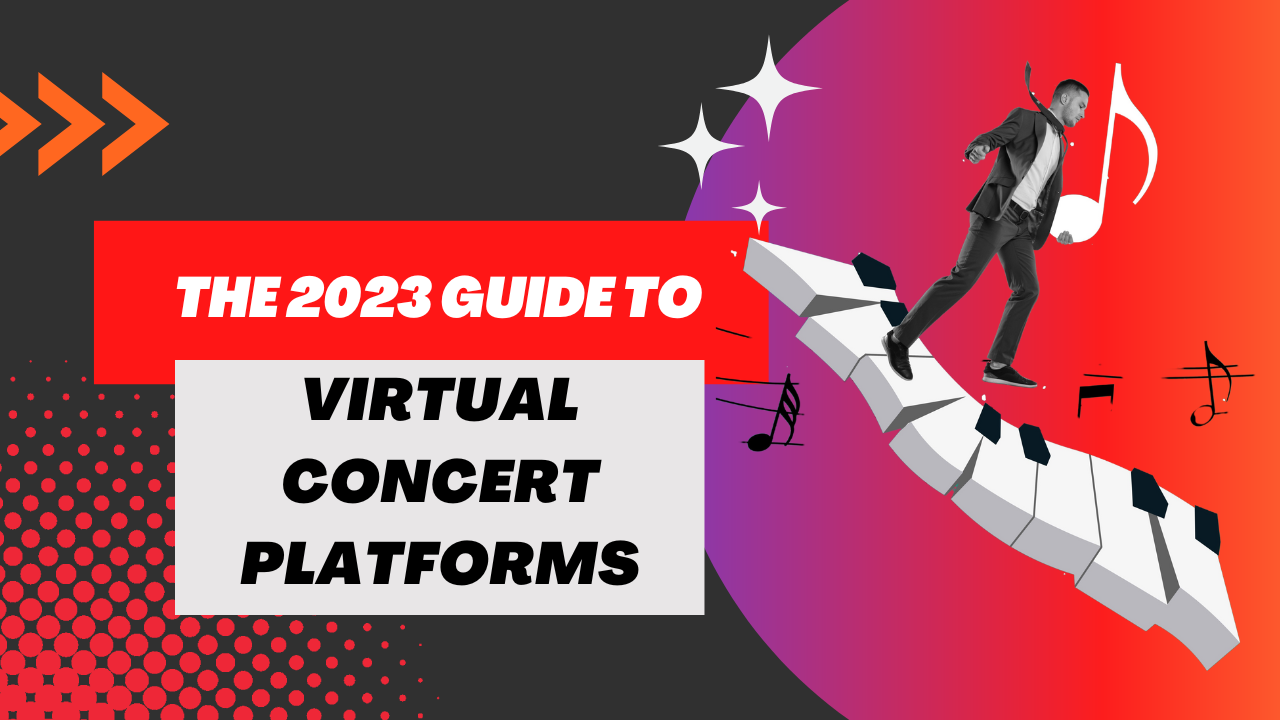Virtual concerts are quickly becoming the new norm among gigging musicians, finally providing artists with digital tools to connect with fans, showcase their talent, and make a reasonable income. With a new, emerging generation of specialized virtual concert platforms available, it can be difficult to decide which ones are the best and where to begin. Let’s take a look at the top six platforms musicians can use to host or get hired for virtual concerts.
But let’s first briefly examine why virtual concerts are becoming the next big thing in the music industry.
Why are virtual concerts becoming popular?
There are several reasons why musicians and fans are turning to virtual concerts as an alternative to traditional, in-person live concerts. Here are just a few:
- The rise of technology: Advances in technology have made it possible for musicians to host virtual concerts with high-quality audio and video, easily and at a reasonable cost. Fans can now enjoy a live concert experience from the comfort of their own homes or pick and choose the bands they want to listen to live, even if they’re on the other side of the country.
- Accessibility & Convenience: With the advent of technology, virtual concerts allow musicians to reach wider audiences, regardless of location. Music fans in the United States travel an average of 43 miles to get to a concert. On top of rising ticket prices, transportation and accommodation costs are making concert attendance almost prohibitively expensive. Virtual concerts are the answer, for both fans and artists.
- Cost-effective: Hosting a virtual concert is 3 to 10 times less costly than hiring an in-person live band for a small event and tens of thousands of dollars less expensive than organizing a traditional live concert. Musicians and hosts can save on expenses such as rental fees, equipment, staffing, transportation, and accommodation.
- Interactive experience & Inclusivity: Virtual concerts provide a unique and interactive experience for both musicians and their fans. Musicians can engage with their fans through live chat and Q&A sessions, and fans can interact with each other and the artist. Many music fans may not want or be able to attend in-person live concerts, whether due to disability, cost or just preference. Virtual concerts are a welcoming environment for everyone.
With these and many more benefits of virtual concerts, it’s no wonder that they are becoming increasingly popular as an alternative to traditional live concerts.

Our Top 6 Picks: Virtual Concert Platforms for Musicians in 2023
1. Virtuosica
We’re not going to pretend that Virtuosica isn’t our favorite virtual concert platform, especially for up-and-coming and gigging musicians. That’s why we built it.
Virtuosica is the first platform that was built exclusively with live virtual concerts in mind. Available now in open beta, the platform provides a toolkit for anyone, fans and musicians, to create and host private virtual concerts of their own. From setting performance fees and dates to hiring mechanisms, payment processing, and in-platform, ultra-low latency live streaming – Virtuosica is the all-in-one platform for this new era of live music.
Virtuosica doesn’t provide tools for ticketed virtual events at this time, but has announced that this and more features will be added in the next phase of development. This is also the only live music streaming platform that has performance rights agreements with BMI and ASCAP, which means it covers rights for over 90% of copyrighted music for live virtual performances in the U.S. market. With Virtuosica, musicians can create a personalized profiles, get discovered and hired, and showcase their music, skills, and personality like never before.
2. StageIt
StageIt provides a virtual stage for musicians to perform live, interact with their fans, and reach a wider audience. However, its feature lets artists monetize their performances, making it stand out for virtual concerts.
At StageIt, musicians can set ticket prices and receive direct payment from their fans for each performance. This provides a significant financial benefit for artists, especially in the current climate where live concerts are hard to organize. Musicians can create personalized profiles, set up merchandise sales, and interact directly with their fans through live chat and Q&A sessions. The platform now also allows for high-quality audio and video streaming, ensuring fans a solid virtual concert experience.
3. Twitch
Then there’s also Twitch, a widely popular virtual concert platform for musicians due to its strong focus on interactivity and community building. Originally created for gamers, it has expanded to include a wide range of categories, including music, and has become a haven for musicians looking to get started with virtual live music performances. Musicians can use Twitch to stream live concerts and monetize their performances through subscriptions, tips, and merchandise sales.
Besides this, Twitch allows musicians to interact with their fans in real-time through live chat and Q&A sessions, providing a unique and interactive experience for musicians and their fans. However, the thing that differentiates Twitch from the rest of other platforms is its large and active community of users, which helps the musicians connect with new fans and build their audience.
4. Bandcamp
Bandcamp is a pioneering music distribution platform that has recently added a virtual concert live streaming feature. Like Virtuosica, the feature centers around live, one-time events. Bandcamp provides a space for musicians and bands with (mostly) original music to build a dedicated fanbase and share their art more sustainably.
With its emphasis on music discovery and fan engagement, Bandcamp is the perfect platform for independent musicians looking to grow their following and connect with fans on a deeper level. Musicians can easily upload and sell their music, merchandise, and tickets to virtual concerts directly to fans, cutting out the middleman and retaining a greater share of the profits. But what truly sets Bandcamp apart is its community-driven atmosphere. Fans can leave comments, share their favorite songs, and interact with artists directly through the platform. This creates a sense of closeness and connectedness between musicians and their fans that is unmatched by other virtual concert platforms.
5. Sessions
Sessions is a virtual concert mobile app for modern musicians. With its user-friendly interface, Sessions is revolutionizing how musicians connect with their fans and monetize their performances in mobile format.
In addition, Sessions Live offers multiple monetization opportunity with built-in ticketing for events. Musicians can sell tickets to virtual concerts and receive payment directly from their fans. The platform also provides a platform for fans to purchase merchandise and support their favorite artists financially.
6. Vimeo Livestream
Last but not least, there’s Vimeo Livestream. Not a virtual concert platform per se, but still offering live streaming capabilities appropriate for live concert streaming. Vimeo Livestream provides a sophisticated, enterprise-level, and engaging platform for musicians to connect with their fans and monetize their performances. At the same time, its creative aspect allows musicians to add eye-catching graphics, special effects, and branding elements to their performances, creating a unique and immersive experience for their fans.
But Vimeo Live isn’t just about the technical details. It’s also designed for monetization, allowing you to sell tickets to your virtual concerts and receive payment directly from your fans. Whether you’re looking to supplement your live performance income or create a steady stream of revenue through virtual concerts, Vimeo Livestream has you covered, albeit at a cost.

Bonus Tip
YouTube Live
Not many musicians would think of using YouTube Live as a virtual concert platform, but it is a hidden gem due to its large reach, cost-effectiveness, and user-friendly interface. With over 2 billion monthly active users, YouTube provides musicians with a vast audience to connect with, making it an ideal platform to showcase their talent. The downside is that, YouTube continues to provide unsatisfactory monetization tools and is not a viable significant revenue stream for musicians.
Hosting a virtual concert on YouTube Live, however, is free, making it a cost-effective option for musicians who are just starting or those on a tight budget. The platform’s user-friendly interface makes it easy for musicians to set up and host their virtual concerts, allowing them to focus on their performance and engage with their fans. Additionally, the platform allows live chat and Q&A sessions, providing a unique and interactive experience for musicians and their fans. Overall, YouTube Live provides a convenient, accessible, and cost-effective way for musicians to connect with their fans and showcase their talent through virtual concerts.
That said, virtual concerts have become an essential part of the music industry, providing musicians with a platform to connect with their fans and showcase their talent. The top 5 virtual concert platforms reviewed in this article offer a unique and high-quality experience for musicians and their fans, making it easy for musicians to host virtual concerts and reach a wider audience. Whether you are a seasoned musician or just starting out, these virtual concert platforms are worth considering for your next virtual concert.

